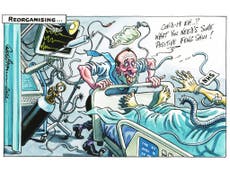Hancock’s re-disorganisation of the NHS won’t help a single patient
Analysis: The NHS faces big challenges that the government’s new proposals don’t fix, warns health correspondent Shaun Lintern


Your support helps us to tell the story
From reproductive rights to climate change to Big Tech, The Independent is on the ground when the story is developing. Whether it's investigating the financials of Elon Musk's pro-Trump PAC or producing our latest documentary, 'The A Word', which shines a light on the American women fighting for reproductive rights, we know how important it is to parse out the facts from the messaging.
At such a critical moment in US history, we need reporters on the ground. Your donation allows us to keep sending journalists to speak to both sides of the story.
The Independent is trusted by Americans across the entire political spectrum. And unlike many other quality news outlets, we choose not to lock Americans out of our reporting and analysis with paywalls. We believe quality journalism should be available to everyone, paid for by those who can afford it.
Your support makes all the difference.New governments cannot resist the temptation to fiddle with the NHS and Matt Hancock’s latest attempt at reforms are a classic example of Whitehall’s belief in its own benevolence towards the health service.
There are many things to welcome in the new white paper – the NHS has been eager to tidy up the unholy mess the last legislation MPs, including Mr Hancock, voted through in 2012.
Creating new integrated care organisations who will be focused, not on competition, but collaboration and delivering services tailored to need has widespread support.
But the problem with the government’s proposals is that it ducks almost all of the most pressing issues.
The pandemic has underlined the urgent need for a proper comprehensive workforce plan for the health service. Nurses have been working at dangerous staffing levels during the Covid crisis and we don’t yet know the full extent of how bad wards became during the height of the surge.
Similarly for doctors and other clinical roles, the UK lags most developed countries. Staff are exhausted and many are reporting symptoms of post-traumatic stress. Some will leave and not come back.
But the legislation proposed by the government ignores this huge risk almost entirely, apart from a half-baked reference to a report being produced once every parliament that sets out responsibilities on workforce supply.
What is needed is long-term funding so the NHS can plan for, train, recruit and crucially retain its nurses, doctors and myriad of other staff working in vital roles.
There is also no solution to the wicked problem of social care which is facing at least a £5bn funding gap over the next few years and with an ageing population needing ever more complex care.
The constant promises from ministers that a plan is in the pipeline rings especially hollow now in the wake of more than 25,000 care home resident deaths during the Covid crisis.
Nowhere in the bill is a plan for the NHS to recover from coronavirus, no detail on the investment the government will make to ensure hospitals have the beds they need to carry out the operations. The latest NHS statistics on Thursday revealed almost 225,000 patients are waiting longer than a year for their operations in December with the waiting list growing by 100,000 a month.
The cost of maintaining crumbling hospitals has jumped to more than £9bn with increasing numbers warning of safety risks. We saw again during the pandemic the consequences of years of under-investment during the Covid crisis when some hospitals had to turn patients away because their oxygen supply systems couldn’t cope.
Reforming the NHS is a temptation new governments with healthy majorities can rarely avoid. The NHS is used to being regularly re-disorganised and the consequences can be dire for patients when service managers and staff get distracted by such reforms.
Under the new legislation, Matt Hancock is planning to gift himself substantial new powers over NHS England and the wider regulatory landscape.
Proposals include allowing him to transfer functions from one organisation like the Care Quality Commission to another. The government could scrap professional regulators like the Nursing and Midwifery Council, and even de-regulate some professions.
The legislation would allow the secretary of state to intervene in local reconfigurations “at any point”.
The intent is clear – Whitehall and the Department of Health and Social Care want more grip on the day-to-day running of healthcare. In a taxpayer funded system where politicians face tough questions about the standard of services, it’s understandable why they would want to have this power.
Without tackling the biggest challenges that face the health service, any reforms will be unlikely to save Mr Hancock from criticism and guarantee dire consequences for patients.



Join our commenting forum
Join thought-provoking conversations, follow other Independent readers and see their replies
Comments